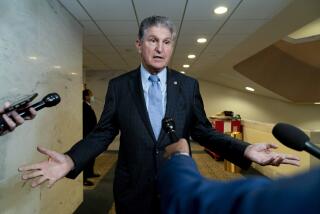Darman Sees Even Chance for Capital Gains Cut : But Insists Bush Will Not OK Hike in Other Taxes in Trade-Off
- Share via
WASHINGTON — White House Budget Director Richard G. Darman said Thursday he is “encouraged” by the willingness of House Ways and Means Committee Chairman Dan Rostenkowski (D-Ill.) to consider cutting capital gains tax rates but insisted that the Bush Administration is not prepared to accept any other Democratic tax proposals in exchange for a lower capital gains tax.
Darman told reporters: “There is absolutely no weakening of the ‘duck test’ in trade for capital gains,” referring to his favorite test, under which any type of proposed revenue increase that “quacks like a duck”--a tax hike--”is a duck.”
Not Insisting on Own Plan
The White House is not necessarily insisting on its own capital gains proposal, he said, and is prepared to look at “any reasonable capital gains initiative.”
Darman, who, before the White House reached a budget agreement with Congress in April, had said that the odds of cutting capital gains taxes were 1 in 100, put the chances today at “something like even money.”
Last month, The Times disclosed that Rostenkowski was preparing to retreat from his opposition to a capital gains tax cut, opening the door to a possible compromise with Bush on the issue.
Rostenkowski confirmed his turnaround publicly last week but gave reporters different statements of what he might want in return for such a concession. In one interview, he said: “I’m not going to prostrate myself to help this President without getting something the Democrats can enjoy.”
Since then, many Democrats on the House tax-writing panel have vowed to oppose any capital gains reduction, but Rostenkowski is still exploring it as a possibility.
Bush has proposed to cut the maximum capital gains rate to 15% from the current top rate of 33%, with the low rate eventually limited to those who hold stocks, bonds and similar assets for at least three years.
Rostenkowski’s staff, under pressure to develop an alternative that would generate additional revenues to help meet next year’s budget target, has come up with a plan to cut the capital gains tax to 20% for only one year, but thereafter index capital gains so that investors would not be taxed on profits that merely reflect inflation.
Temporary Revenue Surge
Any changes in capital gains taxes, which are collected on the income from sales of property or investments, are likely to produce at least a temporary surge in revenues by encouraging investors to cash in their profits.
On a separate matter, Darman said the Administration is looking at ways to encourage more private savings, but he questioned the potential effectiveness of a reported Treasury Department proposal for a new form of individual retirement accounts.
The Washington Post disclosed Thursday that Treasury officials were looking at a plan for an IRA that would not provide an immediate tax deduction but would grant a tax advantage on retirement by allowing money to be withdrawn tax free. Administration officials confirmed that it is among a number of ideas that Bush may propose later this year or early next year.
Although conceding that such “backloaded” IRAs would have the advantage of avoiding adverse budget effects immediately, Darman said he doubted whether they would encourage people to save more.
“I’m very skeptical,” he said, because the long delay in receiving any tax advantage probably would not induce many taxpayers, who already find it difficult to set aside money, to increase their savings.
Darman confirmed reports that the Administration no longer expects real economic growth to reach 3.5% this year. In addition, interest rates that are higher than previously projected will add to government spending, but the overall budget deficit figures are unlikely to change much because new projections of higher inflation will help make up for any revenues lost from lower real growth.
The Administration is working on three separate forecasts calling for growth of 3.2%, 3% or 2.9%. Darman said he will present a single forecast by July 15 that will be used to determine whether next year’s budget can be projected to meet the deficit target of $110 billion.
More to Read
Get the L.A. Times Politics newsletter
Deeply reported insights into legislation, politics and policy from Sacramento, Washington and beyond. In your inbox three times per week.
You may occasionally receive promotional content from the Los Angeles Times.










